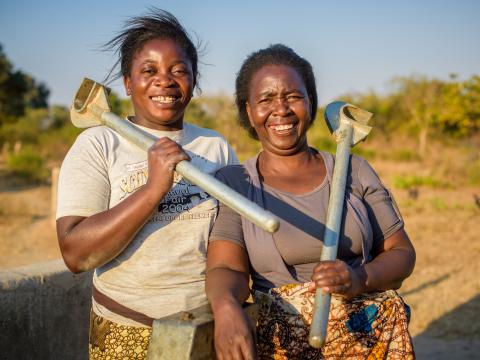5 women who are "making it happen" for International Women's Day

The theme of International Women's Day is "Make It Happen". Here are a few women who are making it happen for themselves, their families and their communities, and by doing so are making the world a better place.
The Pump Team
In a village in Zambia, the borehole pump repair team includes best friends Pesia and Sarafina. They were trained by World Vision, and have worked with the WV water and sanitation team since 2010.
Pesia (L) and Sarafina (R) help their team repair the borehole.
Pesia describes her work: “The community chose us. We really wanted to work with World Vision. We were just farmers... We saw boreholes that were broken. We hated that. We can do anything men can do as long as we are trained. It is unusual that they chose us. Most of our women friends said we couldn’t do it."
We can do anything men can do as long as we are trained.
Sarafina agrees, and says, “My children are surprised but they say 'the work you are doing is amazing. I want you to teach me so I can be like you'.”
Their work benefits not just the community who now has clean water. According to Pesia, “For my boys [sons] they say I encourage them. When they saw me building this borehole my boys said, 'We want you to help us build our houses.'”
The Art Therapist
Jwan Amer was born during a war, and grew up without a father. From a young age, Jwan always felt that she had creative blood in her, and loved sculpting.
With time and lots of hard work, Jwan completed a degree in Fine Arts focused on Art Therapy. After living abroad for more than 20 years in Sweden and Canada, she felt it was time to return to Iraq.
Jwan Omar puts up a poster in a Women and Young Children's Space in Sulaymaniyah Governorate in Iraq.
Initially she worked with a local organization helping refugee children from Syria who had been traumatised by war through art. She saw the impact of art in their lives and saw the need for more such programmes.
"Even the simplest of creative activities can provide a venue for women and children to start their healing process,” she says. “What is important is we help them make it happen."
Today, she works as supervisor for World Vision’s programme for Women and Young Children’s Space (WAYCS) in the Sulaymaniyah Governorate in Iraq.
“I know how they feel. I also want to encourage Iraqi women to never give up and never lose hope,” she adds. Although the work with World Vision is just beginning, Jwan is very excited, knowing how much the women of Iraq have to give. Read more about her work here.
The Ebola Survivor
Maseray knows Ebola's toll firsthand. The virus has taken her husband, sister, and another close relative during its nine-month rampage through Sierra Leone. Ebola struck her as well, but she survived.
She recently started working on a burial team in Bo, a major city in south central Sierra Leone, so she could give back to her community.
Maseray carries a baby's body, during a safe and dignified burial.
World Vision leads the national effort to train, equip, and coordinate burial teams for Ebola victims in Sierra Leone that preserve long-held traditions, yet prevent Ebola contamination.
After completing the one-week training course to ensure she is prepared for her duties, Maseray is about to carry out her first Safe and Dignified Burial. “I am ready for this day. I will execute all what I have being taught in the training,” she says. Read more about her work here.
The Advocate
Rekha is a college student and an advocate. She also is without the use of her two legs, but that's not really an issue for her.
Rekha proudly displays the certificate she received when she participated in the UN General Assembly “My World Survey” initiative (post 2015 discussions) in New York.
Through her involvement with World Vision, Rekha has transformed into a feisty advocate for children with special needs. From being a national convener of the National Forum for Children with Disability, created by World Vision, to speaking at the New York UN general assembly as a representative of a children’s delegation, Rekha continues to work towards to her goal of becoming a social worker.
"As a person with special needs I got to pose questions to government officials about why people like me are alienated and made to feel different. The strength and the confidence to share about all the challenges and disappointments that we face because of lack of privileges somehow came from within me. Now I know that I am not less than anybody, I can also speak out for my rights and I know my rights," says a fired up Rekha. Read more about Rekha and her advocacy work here.
The Teacher
Since she was thirteen, Keiti has volunteered as a teacher at the only computer room in Batey 6, supported with World Vision in partnership with the Dominican Telecommunications Institute (lNDOTEL).
Keiti assists one of her students in the computer class.
Carrasco, who is now 15 and in 12th grade, spends each weekday morning teaching computer classes to at least 20 children aged 8 to 13 years old from her community.
“I used to be scared of speaking in public, but through World Vision, now I can get by. No matter how old you are, you must grow, develop and exploit the opportunities offered to you, learn and teach others.” Read more about how she is helping her community here.
Learn more about World Vision's Gender programme: http://www.wvi.org/gender